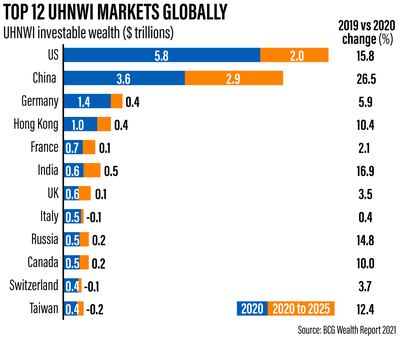The UAE’s financial wealth hit $600 billion in 2020, undeterred by the Covid-19 pandemic’s financial effects, having grown at a compound annual rate of 3 per cent from 2015, according to a new report by the Boston Consulting Group.
Investable wealth accounted for about 69 per cent of it, the BCG report titled Global Wealth 2021: When Clients Take the Lead, revealed.
Global financial wealth rose by more than 8.3 per cent last year to reach a high of $250 trillion, compared with a decline of 8 per cent after the 2008 financial crisis, the management consultancy said.
“Most market crises have an impact on financial wealth globally. However, the pandemic last year was atypical,” said Mustafa Bosca, managing director and partner at BCG.
“Equities and investment funds grew by 11.5 per cent in 2020 due to strong capital market performance. There was a record growth of 10.6 per cent in cash and deposits due to a spike in the savings rate.”
The boom in global financial wealth was attributed to a sharp increase in new savings and a strong stock market performance fuelled by supportive central bank policies, the management consultancy said.
The Covid-19 pandemic pushed the global economy into its deepest recession since the 1930s, prompting governments to inject $16tn in fiscal stimulus last year to bolster their economies as businesses closed and millions of people lost their jobs.
However, stimulus packages, backed by $9tn in monetary support from central banks, led to a resurgence in stock markets in the second half of 2020, propelling global equities to record highs.
The UAE, where 51 per cent of the country’s wealth is owned by people whose net worth is more than $5 million, represented 26 per cent of the GCC’s financial wealth in 2020.
Wealth in the Emirates is expected to grow by a compound annual rate of 4 per cent to $700bn by 2025, according to BCG estimates. Meanwhile, total net wealth in the GCC is projected to reach $6.3tn by 2025, from $5.2tn in 2020.
Saudi Arabia and the UAE account for 71 per cent of the region’s total wealth, said Mr Bosca.
“The UAE has established itself as a leading global financial centre holding significant cross-border wealth. The Emirates is the sixth largest financial centre for cross-border wealth,” he said.
Meanwhile, more than 6,000 people globally became ultra high-net-worth individuals, or UHNWIs, in 2020, according to BCG.
The UHNWI bracket, consisting of people whose fortunes exceed $100m, now includes 60,000 people with a combined $22tn in investable wealth, representing 15 per cent of the world’s total investable wealth, the study revealed.
This echoes a June report by investment bank Credit Suisse that said more people globally became millionaires for the first time in 2020 despite the economic damage caused by Covid-19.
The global number of millionaires grew by 5.2 million to reach 56.1 million in 2020.

While the US currently accounts for most UHNWIs, China is on track to overtake it by the end of the decade, according to BCG.
The consultancy estimates that should growth continue at its current 13 per cent annual rate, China will be home to $10.4tn in UHNWI assets by 2029, followed closely by the US with a projected total of $9.9tn.
Women now account for about 12 per cent of the super rich, with most of them living in the US, Germany and China, according to BCG research.
The study found that equities and investment funds (47 per cent) accounted for the largest proportion of invested onshore assets in 2020.
However, the allocation of onshore assets is set to change by 2025, with currency and deposits set to account for a larger share of onshore assets (47 per cent) in the UAE.
Citing an underserved market, BCG said there are 4.5 million individuals in the Middle East who hold between $500,000 to $10m in their portfolio and have $800 billion in investable wealth.
“Many wealth managers are not yet ready to serve them,” said Mr Bosca.
Separately, the BCG research found that 1.5 billion people around the world – about one in every six individuals – will be at least 65 years old by 2050. That is twice the size of today’s retiree population.
“Individuals in this age band today own $29.3tn in financial assets accessible to wealth managers. Over the next five years, that figure will grow at a [compound annual growth rate] of close to 7 per cent, which means that wealth managers globally will be able to target close to $41.1tn in financial wealth by 2025,” the BCG report said.
Interactions with wealth managers often wind down as clients reach their middle and late retirement stages, leaving many retirees "asset-rich and advice-poor" at a time when their needs are most complex, the study found.







